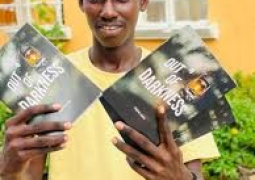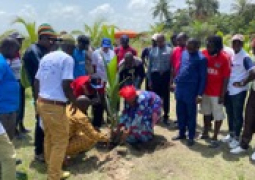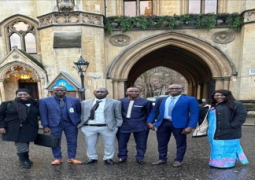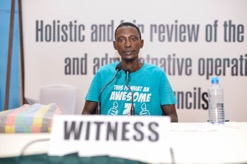
According to the witness, he banks with two banks: Trust Bank and GT Bank. He said his salary account is with Trust Bank and it is a savings account. He also said that he is on grade 5.8 of the Government Integrated Pay Scale, and that after all the deductions, his salary is D5,933 dalasis.
Witness Manneh was shown his GT Bank account statement, dated 6th of September 2023 and covering 4th of May 2018 to 6 of September 2023. His Trust Bank account statement, dated 7 September 2023 and covering the first of May 2018 to March 2023, was also shown to him. Both account statements were admitted into evidence.
On the statement in relation to the GT Bank account, the Counsel said there were various deposits made by the witness. The total of which amounted close to D400,000.
“First, let me start with 15th of August 2018. You made no deposit in the council account and in this period you were doing revenue collection. Is that not the case?
“What?” the witness exclaimed in a surprising tone.
Taking it slowly and uttering sentence by sentence, the Counsel then put it to the witness that he was a revenue collector in 2018, and the witness affirmed.
“But from the 15th of August all the way to the 18th and 26th of December 2018, you made no deposit from any revenue that may have been collected,” the Counsel said again. The witness also affirmed, adding that if he did not deposit anything, then that meant he had not done any collection.
“But in your account, you have deposited about D90,000 on the 11th of December 2018. Where did that money come from?” the deputy lead counsel asked.
“Yes, sometimes they would send me remittances from Europe,” he answered.
Asked who deposited the money in his personal account, he acknowledged that he did. However, he stated that sometimes the money was sent and after receiving it, he would deposit it into his account.
“Now, tell me this particular deposit that you made in your GT Bank personal account. Where was that money coming from? Don’t give me any form of hypothesis or any form of imaginary situation. It is a factual situation now. Where did that money come from?
“Yes, this is what I am saying. This is money from remittance from Europe,” the witness responded.
He told commissioners that the money was sent by his aunt, one Jabou Manneh in Holland. She sent him about D93,000 dalasis and was for his mother, the witness implied.
He said he received the money in dalasi, and it was sent through a local dealer, whose name he could not remember and whom it would be difficult to find.
“Manku that was D90,000. Now 1 January and 21 February 2019, no deposits were made in the council’s account by you. Now you deposited, on 9 January 2019, about D63,000.
“Yes, these were all monies from my aunty meant for my mother,” he testified.
Quizzed how the D90,000 was sent, he said it was through his younger brother Alagie Bamba Manneh, who he said forwarded it to him. He said his younger brother is currently living here in Kombo (Greater Banjul Area).
The witness was asked why his aunt didn’t send it to him directly, and he said sometimes that was how his aunt carried out things.
He said his brother sent him the money through his GT Bank account. He was asked by Chairperson Jainaba Bah to go through his GT Bank account statement to ascertain and tell the Commission where his brother sent him money in January.
He did as asked but he did not find any. Chairperson Bah then asked him to tell the Commission the truth, saying that he was untruthful.
The witness admitted that it was not his brother then, since it was not on the document. However, he said could not remember exactly but there was a time he was sent money by his brother.
Again, the witness admitted having deposited D63,000 that was deposited in his account on 9 January 2019.
Quizzed again by the counsel as to where the D63,000 came from, the witness said he didn’t know, although had said prior that the money was sent by his aunt.
“Mr Manneh, you said your aunt sent you the money. But now you cannot remember,” the Counsel said.
“Yes, you know, these things are long. I might not remember,” he responded.
“Mr Manneh, you said your aunt sent you the money. Now when you were caught lying or caught misrepresenting the facts that your brother sent you the money in your account, now you changed the story. But now you don’t know where the money came from. You will move. That’s not a problem.
“Again, from 11 April 2019 to 5 May 2019, no deposits were made to the Council’s account by yourself Manku Manneh. But you deposited D10,000 on the 6th of May 2019 in your own account. Where was this money coming from?
He answered saying: “Counsel, this is what I am saying. Sometimes I receive remittances to conduct work at home.
Asked whether he could provide documentary evidence, he said could not.
At the juncture the counsel addressed the witness, saying: “This is the burden on you. You see, to be honest, I would be very happy if you could provide documentation to prove this. Neither the commissioners nor the counsels want to attribute [to you] what is not really yours. Do you understand that? We would not make any attribution in relation to whether you spent certain monies for your own self or so. But if you cannot prove it, you are sitting down here saying that they were remittances would not solve any problem.
“So on 6 December, you made a deposit into your account when you made no deposit into the Council’s account in that period. Where did you get the money?”
The witness responded saying: “Counsel, I don’t think I could take all this huge amount of money or revenue without the Council knowing and without them taking action against me.”
Reacting to these words by the witness, Counsel Gomez again said: “Why are you saying that? Am I saying that you are taking this money from the Council’s revenue? But then since you have already put it up. We know that there were a lot of financial malpractices. You yourself have been going to collect money during the time when you were on your leave, and going with the finance director to collect and give the finance director money. All these allegations were already being investigated and documented by the auditors. So don’t tell me that. You would not have been questioned if you were not engaged in some . . . . Are you not the same Mr Manneh that had the device in his house?”
The witness was challenged or rather quizzed in relation to other similar transactions, most of which, if not all, he could not adequately explain.
Read Other Articles In Headlines
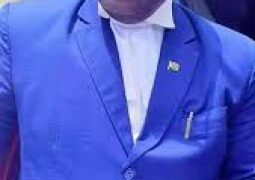
Lawyer Camara rejects witness testifying without written statement as ‘prejudicial’
Dec 11, 2025, 12:23 PM
